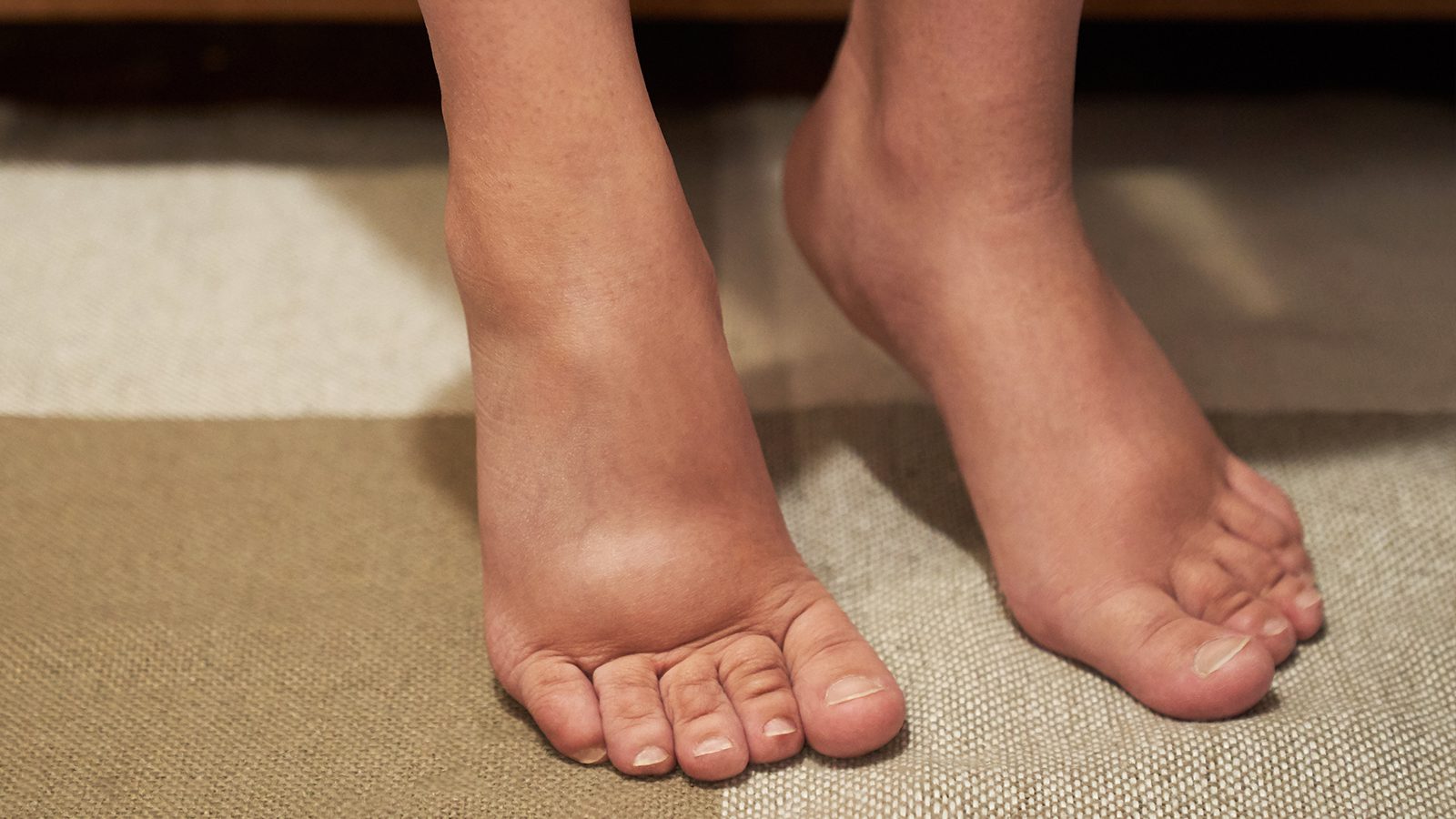Here’s what you should know if you deal with your feet swelling.
Swollen feet, medically known as edema, can be uncomfortable and sometimes painful. While it’s often associated with prolonged periods of standing or sitting, several other underlying causes can lead to this condition. In this article, we delve into the science behind five common causes of swollen feet and provide natural health solutions to alleviate the discomfort.
Swollen feet are uncomfortable but might be harmless and go away with some rest and care. However, the condition can also reveal a more complex diagnosis. So if you experience this condition regularly, or the swelling does not resolve itself, seek the advice of a medical professional.
1. Gravity Can Lead to Swollen Feet if You Sit Too Long
Gravity is a fundamental force that impacts our bodies in ways we often don’t realize. It’s the force that keeps us grounded. But scientists say it can also contribute to additional health issues like swollen feet, especially after long periods of standing or sitting.
When we remain stationary or sedentary for extended periods, gravity pulls fluids toward our feet. This downward pull can cause fluid to accumulate in the tissues within the lower extremities. That may lead to swelling, discomfort, and sometimes pain when sitting too long.
How to fix it:
The key to combating the effects of gravity is movement. Regular physical activity encourages circulation, helping to distribute fluid evenly throughout the body.
So if your job or lifestyle involves prolonged sitting or standing, take short breaks every hour to walk around or stretch. Additionally, elevating your feet when sitting or lying down with your feet propped up can help. By raising your feet above the level of your heart, you’re using gravity to your advantage, encouraging the excess fluid to drain away from your feet and ankles.
2. Salt Intake Can Contribute to Swelling in the Lower Extremities
Salt, or the sodium it contains, plays a crucial role in fluid balance within our bodies, warns the National Institute of Health. Sodium helps regulate the amount of water in and around your cells.
However, consuming too much salt can disrupt this delicate balance. When we ingest excessive amounts of sodium, our bodies hold onto more water to offset too much sodium. This imbalance can lead to fluid retention, often as swelling in the feet and ankles.
How to fix it:
The most effective way to manage swelling caused by excessive salt intake is to reduce your sodium consumption.
That doesn’t just mean putting less salt in your food. Instead, it also involves making mindful choices about what you eat. Processed, fast, and restaurant dishes often contain high sodium levels.
Look for fresh, organic fruits and vegetables, lean proteins, and whole grains instead. These foods are lower in sodium and rich in other essential nutrients.
3. Kidney Disorders Can Cause Foot Swelling
The kidneys are vital organs that regulate a number of essential functions, including managing fluid balance. They filter our blood, removing waste products and excess fluid in urine.
But the National Institute of Diabetes and Digestive and Kidney Diseases explains that when the kidneys aren’t functioning correctly, they may not remove extra fluid as effectively. That can contribute to fluid buildup in the body, which can cause swelling in the feet and ankles.
How to fix it:
While kidney disorders require medical attention, specific dietary changes can support kidney health and help manage symptoms. A kidney-friendly diet is typically rich in fruits, vegetables, and whole grains. It is also low in sodium and protein. This diet can help manage kidney disease by reducing the amount of waste that needs to be filtered.
It’s also important to stay well-hydrated. But follow your healthcare provider’s guidance on how much fluid you should consume daily.
4. Pregnancy Can Cause Feet to Swell
Pregnancy often leads to swollen feet due to the additional weight and fluid the body retains to support the growing fetus. As the uterus expands, it can also put pressure on the veins in the pelvic region. As a result, it can disrupt blood’s return from the lower extremities to the heart. Therefore, it may lead to fluid accumulation in the feet and ankles.
How to fix it:
Regular exercise can help reduce swelling during pregnancy by improving circulation. Activities like walking, swimming, or prenatal yoga can be beneficial.
It’s also helpful to rest and elevate your feet whenever possible to facilitate fluid drainage. Wearing comfortable shoes and avoiding standing for extended periods can also help manage swelling.
5. Varicose Veins May Contribute to Swollen Feet
Varicose veins are enlarged veins that appear under the skin’s surface. Doctors from the Duke University Vein Clinic explain how they occur when the valves in the veins do not function correctly, leading to poor blood flow. That can cause the blood to pool in the veins, leading to swollen feet, toes, and ankles.
How to fix it:
Regular exercise, healthy weight maintenance, and wearing compression stockings can help manage varicose veins and reduce swelling. Exercise promotes healthy circulation, preventing blood from pooling in the veins.
Keeping a healthy body weight reduces pressure on the veins, while compression stockings provide external support, promoting better blood flow. Elevating your feet when resting is beneficial to encourage fluid drainage.
6. Heart Conditions May Cause Feet to Swell
Certain heart conditions can also lead to swollen feet and ankles. The heart pumps blood throughout the whole body, replenishing oxygen and nutrients in the body’s tissues–including the feet.
However, heart failure and related conditions can impair the heart’s ability to pump blood effectively. When the heart doesn’t pump blood efficiently, blood can back up in the veins, causing fluid to accumulate in the tissues. That can lead to peripheral edema, swelling in the lower extremities, feet, and ankles.
How to fix it:
Lifestyle modifications are vital to managing heart conditions and the associated swelling. Regular physical activity is crucial as it helps strengthen the heart muscle, improves circulation, and helps maintain a healthy weight. A heart-healthy diet is also essential.
It involves consuming various nutrient-dense foods such as fruits, vegetables, whole grains, lean protein sources, and healthy fats while limiting sodium, saturated fats, and added sugars intake. It’s also essential to avoid smoking and limit alcohol consumption. While these lifestyle changes can help manage symptoms, heart conditions typically require medical treatment, so following your healthcare provider’s advice is essential.
When to Seek Immediate Medical Attention
If the swelling is accompanied by chest pain, difficulty breathing, confusion, or fainting, seek medical attention immediately. That’s because each of these could be signs of a dangerous heart or lung condition.
To diagnose the cause of the swelling, a healthcare provider will generally conduct a physical examination and review your medical history. They could also order blood tests, urine tests, X-rays, ultrasounds, or CT scans.
Final Thoughts on Knowing the Causes and Fixes for Swollen Feet
Swollen feet, while a common occurrence, should not be dismissed lightly. This condition, often marked by an uncomfortable accumulation of fluid in the lower extremities, can be a symptom of various underlying health issues, including the effects of gravity, excessive salt intake, kidney disorders, pregnancy, varicose veins, and certain heart conditions.
Understanding these causes is the first step toward effective management. Natural wellness solutions such as regular movement and exercise, dietary modifications, foot elevation, and compression stockings can significantly help alleviate the discomfort of swollen feet. While simple, these strategies can profoundly impact your comfort and overall quality of life.
However, it’s crucial to remember that these natural remedies are not a substitute for seeking professional medical advice or treatment. Persistent or severe swelling, accompanied by other symptoms such as pain, redness, or warmth, could indicate a more severe underlying condition requiring medical attention.
Therefore, you must consult your primary care doctor if you experience persistent swelling in your feet. They can provide a proper diagnosis, and guide you on the most effective treatment plan tailored to your specific needs. A visit to the doctor can also help you navigate any potential health issues causing the swelling.
In the end, your health is your most valuable asset. Taking proactive steps to understand and manage symptoms like swollen feet is vital to maintaining your health and well-being. But remember, while self-care strategies are essential, they work best when paired with regular medical check-ups and open conversation with your primary care doctor.
Please note that this article is for informational purposes only and does not constitute medical advice. Always consult with a healthcare professional for any health concerns.



















